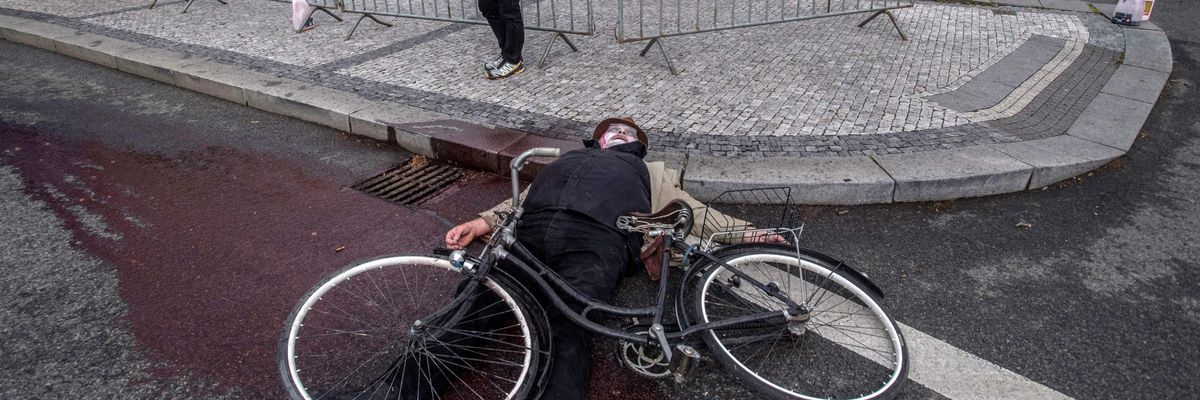Faced with horrific, mounting evidence of their atrocities in Ukraine - bombing schools, playgrounds, orphanages, maternity hospitals, train stations with missiles marked "For the Children"; summary executions and other "grave abuses"; dumping thousands of bodies of burned, tortured, hands-tied
civilians into pits, wells, mass graves or leaving them
strewn in the streets of razed cities; raping women, teenagers, children; driving almost two-thirds of Ukraine's
children, five of 7.5 million, from their lives, with nearly half of those remaining beset by hunger and likely most by lifelong trauma - charged with what are deemed these "unspeakable crimes," Russia has dug deep into full, mad, staggering denial: Nothing to see here. Addressing the U.N. Security Council, Ukraine President Volodymyr Zelenskiy broadcast
images from Bucha of "evil on earth" - civilians shot and killed in the back of the head, hands tied behind them -
charging perpetrators be held accountable: "This is how the Russian state will now be perceived. This is your image." Western leaders concur. Britain termed Russian crimes "truly barbaric"; Biden has
called them "genocide" and joined efforts to bring war crimes charges. Still, Russia blindly denies and refutes. Watching the same bloody images at the U.N., Russian Ambassador Vassily Nebenzia cited "flagrant inconsistencies" by Western media and Ukrainian "terrorists" and argued, "You only saw what they showed you."
Russia's state-run media has eagerly
followed the government's lead, spinning a demented web of lies, half-truths and fetid fantasies to assure its people, now deliberately cut off from all impartial news, that stories of atrocities are a fiction
concocted by Western agitprop and Ukrainian "Nazis." Thus do anchors and pundits on Russian TV daily
"report" news of the war "through Putin's looking glass," exposing a conspiracy to paint their noble soldiers as war criminals. After the massacre of civilians in Bucha, the coverage
reached fever pitch: Viewers were bombarded with images of tanks rolling past dead bodies in the streets, shown hour after hour on huge screens, with a red "FAKE NEWS" in English and Russian splashed across them. "Pay attention," urged an anchor who then replayed
video in macabre slow motion to prove carefully circled "corpses" were just crisis actors. "One extra raises his hand," he noted. "Another stands up, apparently deciding that he has already played his role." Using similar video, outraged host
Olga Skabeyeva went further: She suggested the bodies could be those of residents who'd welcomed Russian "liberators" and were then murdered by Ukrainians, charging the West was "using Bucha to legalize future purges (and) giving Ukraine approval to extrajudicially kill those they deem traitors." Zelensky and the nefarious West
are trying to create "a hybrid, fake version" of the war, she said, in "a flagrantly brutal provocation."As usual, social media helps stoke the flames of hysteria. The
BBC is now
fighting to discredit a video online claiming Ukraine bombed its own train station, and ghouls on the right-wing
Telegram are busy
analyzing the grisly Bucha videos: "Here at the 12th second the 'corpse' on the right is moving his arm. At 30th second (the) 'corpse' sits down. The bodies (seem) to have been deliberately laid out to create a more dramatic picture." Meanwhile, Russian-born rumors keep coming. Recently, Russia's Defense Ministry
charged British intelligence is helping Ukraine with "new false staged provocations accusing (Russia) of allegedly cruel treatment against Ukraine" as a pretext to get Ukraine more weapons from Western countries. They claim Ukraine officials invited Western media to Ukraine's Sumy region to "conduct the filming of staged plots" to "further stoke Russophobia." Much like MAGA world, Russia's misinformation machine seems not to recognize the existence of verifiable facts - from
eye-witnesses, drone
footage, satellite
images - discrediting their claims or showing that, say, a dead person's arm "moving" was in fact a drop of water reflected in a car windshield. War crimes experts in Australia have also
chimed in to counter alternative facts and insist on grim reality: The bodies splayed across the streets of Bucha, they helpfully note, show "definite signs of death."
Much of the rest of the world likewise fights back against a flood of misinformation so
effective Ukrainians sometimes can't convince their own relatives in Russia of the violence they're enduring. Beyond Russia, where dissemination of "fake news" - Bucha, Mariupol - is now a felony, nearby countries are stepping up. In the Lithuanian capital of Vilnius, trains often bearing Russian soldiers pass six times a day between Moscow and Kaliningrad; they now
display dozens of images by Ukrainian photographers of the devastation in their country with the stark message, "Today, Putin is killing civilians in Ukraine. Do you support this?" Say officials, "It's the least that we can do." In Prague, people have staged harrowing, fake-blood-covered protests, re-creating with startling accuracy real deaths in Bucha; die-ins have been
held from London to Frankfurt to Tokyo; and a global
Stand Up For Ukraine concert broadcast from Warsaw, featuring a multitude of A-list artists, raised $10 billion for Ukrainian refugees. In honor of that event, John Lennon's older son Julian
performed his father's famed anthem for peace "
Imagine" for the first time ever; he was accompanied by Nuno Bettencourt on acoustic guitar. Lennon always
said the only time he'd consider singing the song "would be if it was the end of the world." Now, it "reflects the light at the end of the tunnel that we're all hoping for."
Facts, even when gruesome, remain the most potent weapon against malignant fiction. Following the
massacre in Bucha, the
New York Times published a map locating and identifying the bodies found there. It speaks grim volumes: "Man who went out for bread. Six dead in home for seniors. Woman killed in garden. Mother shot next to daughter. Boy found in basement. Family of four. Son shot next to father. Sisters killed in home. Man covered in dirt. Man and woman in concrete pit. Four bodies in street. Man shot in head..."
